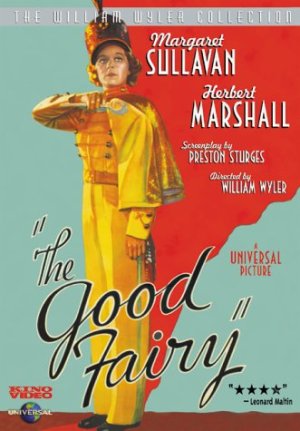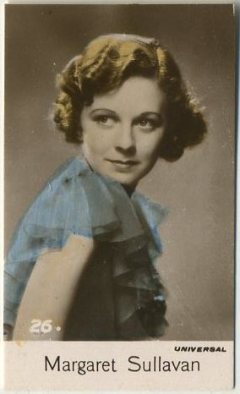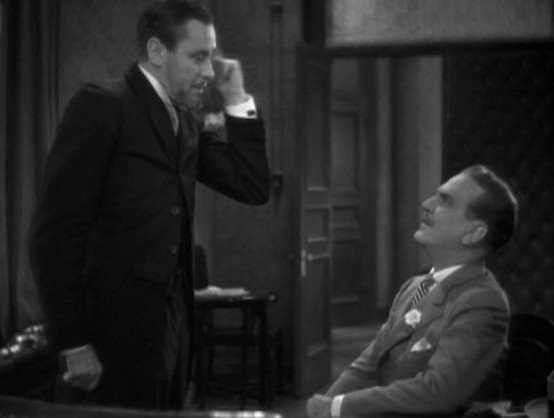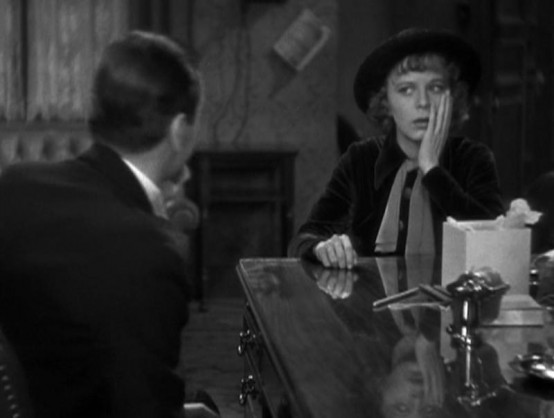 This is Preston Sturges coming into his own. His screenplay for The Good Fairy, said to be a complete rewrite of the Ferenc Molnar play, with fresh pages coming to director William Wyler and the cast with little notice, mixes romantic charm and sophisticated comedy better than any other film release he had worked on to date. Despite critical acclaim for box office flop The Power and the Glory (1933), a story with an entirely different tone, Sturges the writer had shown Hollywood bean counters little evidence of the brilliance he was accorded off the success of his 1929 hit play Strictly Dishonorable. Other early titles such as Child of Manhattan (1933) and Thirty Day Princess (1934) offered sporadic helpings of the sparkling dialogue that peppered his films of the 1940s, but while you can sometimes hear Sturges’ voice in those titles, neither represents a fully ripened effort. Despite being directed by Wyler, still ripening himself but soon to bear fruit for Samuel Goldwyn, The Good Fairy is the first movie that really feels like a Preston Sturges movie. You could play it alongside later titles that Sturges both wrote and directed, and The Good Fairy would not feel out of place in the least.
This is Preston Sturges coming into his own. His screenplay for The Good Fairy, said to be a complete rewrite of the Ferenc Molnar play, with fresh pages coming to director William Wyler and the cast with little notice, mixes romantic charm and sophisticated comedy better than any other film release he had worked on to date. Despite critical acclaim for box office flop The Power and the Glory (1933), a story with an entirely different tone, Sturges the writer had shown Hollywood bean counters little evidence of the brilliance he was accorded off the success of his 1929 hit play Strictly Dishonorable. Other early titles such as Child of Manhattan (1933) and Thirty Day Princess (1934) offered sporadic helpings of the sparkling dialogue that peppered his films of the 1940s, but while you can sometimes hear Sturges’ voice in those titles, neither represents a fully ripened effort. Despite being directed by Wyler, still ripening himself but soon to bear fruit for Samuel Goldwyn, The Good Fairy is the first movie that really feels like a Preston Sturges movie. You could play it alongside later titles that Sturges both wrote and directed, and The Good Fairy would not feel out of place in the least.
 But it’s Margaret Sullavan who really brings Sturges’ story to life. This was no coincidence. Just a couple of years earlier Sullavan had been lured from the stage, where she could count a touring company of Sturges’ own Strictly Dishonorable among her own successes, to make her movie debut in Only Yesterday (1933). She followed with a turn for Frank Borzage in Little Man, What Now?, a performance that had fascinated Sturges, who saw, “a marvelous naivete; a grand potential for vulnerability and innocence in some ways contrary to the blithely manipulative heroine of the play” (Curtis 98). The screenwriter tore apart the Molnar play, rewriting it to fit the 25-year-old actress, tailoring, as Sturges biographer James Curtis put it, “every line of dialogue to Sullavan’s lilting voice” (99). When we first see Sullavan in The Good Fairy she is dressed the same as all of the other girls in the Budapest orphanage, standing out by virtue of her size. She delights the younger girls with her breathless tale of the Good Fairy, a story that she, like Sturges on this screenplay, makes up as she goes along. She acts it out with all of her energy from atop a ladder where she rides a broom so ferociously that that ladder eventually snaps, leaving Sullavan clinging to a lighting fixture that quickly gives out and sends her crashing to the floor. “I was telling fairy stories,” she explains as the matron (Beulah Bondi) enters with a stranger (Alan Hale).
But it’s Margaret Sullavan who really brings Sturges’ story to life. This was no coincidence. Just a couple of years earlier Sullavan had been lured from the stage, where she could count a touring company of Sturges’ own Strictly Dishonorable among her own successes, to make her movie debut in Only Yesterday (1933). She followed with a turn for Frank Borzage in Little Man, What Now?, a performance that had fascinated Sturges, who saw, “a marvelous naivete; a grand potential for vulnerability and innocence in some ways contrary to the blithely manipulative heroine of the play” (Curtis 98). The screenwriter tore apart the Molnar play, rewriting it to fit the 25-year-old actress, tailoring, as Sturges biographer James Curtis put it, “every line of dialogue to Sullavan’s lilting voice” (99). When we first see Sullavan in The Good Fairy she is dressed the same as all of the other girls in the Budapest orphanage, standing out by virtue of her size. She delights the younger girls with her breathless tale of the Good Fairy, a story that she, like Sturges on this screenplay, makes up as she goes along. She acts it out with all of her energy from atop a ladder where she rides a broom so ferociously that that ladder eventually snaps, leaving Sullavan clinging to a lighting fixture that quickly gives out and sends her crashing to the floor. “I was telling fairy stories,” she explains as the matron (Beulah Bondi) enters with a stranger (Alan Hale).
The stranger is Mr. Schlapkohl, general director of the Dream Palace, a 3,000-seat movie theater in need of usherettes. Schlapkohl’s wife suggested the orphanage as a potential source of employees, but he wants to start with just one girl to see how it goes. He suggests “the little acrobat,” Sullavan’s character, soon introduced as Luisa Gingelbuscher, a name which works for laughs throughout The Good Fairy. Luisa, or Lu, is naive, unspoiled and, the matron assures Schlapkohl, innocent. She would never flirt with any of the theater patrons because she wouldn’t even know what it means to do so. Sullavan dons the usherette uniform that she’s pictured in on all of The Good Fairy’s promotional material for just a few moments in the movie. Long enough to for her to make an impression on Reginald Owen’s character, who she confuses directing into the theater and then distracts from the aisle inside. They wind up sharing a cry over a preposterous movie scene we’re allowed to witness in a bit of technique that calls to mind the open of Sturges’ later hit Sullivan’s Travels (1941).
At the end of the evening several men from town hang around the back door of the theater waiting to ask out whichever usherette will have them. The viewer recognizes Cesar Romero’s familiar face—luckily he became a face to be recognized—and know he’s going to be the one to pester Luisa. She’s friendly until she realizes what he wants, then she’s terrified. To escape she finally blurts out, “I’m married,” and grabs hold of the first familiar arm she sees passing by. It’s Owen, who plays Detlaff, a hotel waiter, who soon takes it upon himself to guard Luisa’s innocence. Luisa trusts Detlaff’s face much more than the alleyway Romeo, so she accepts his invitation for beer and sandwiches. After a humorous bit of confusion over Luisa’s release from the asylum, Detlaff invites her to attend a dinner at the hotel where he works, so she can see all of the fine and wonderful things that she’s only been able to imagine from the orphanage.
Detlaff tries to keep an eye on Luisa in the hotel dining room, where she’s fawned over by the stumbling drunk Minister of Arts and Decorations (Eric Blore) and a flirtatious businessman (Frank Morgan), who’s sober but bubbling over with enthusiasm from the moment he spots Luisa. “You don’t look like a butcher,” Luisa tells him after Konrad introduces himself as being in the meat business. Konrad soon sweeps Luisa off to a private dining room where his pursuit is flummoxed several times by Detlaff’s purposefully rude interruptions. Classic movie fans will get a kick out of Oz’s future Wizard comparing himself to a wizard in the woods, who can give Luisa whatever she wants. “Is this the story of the enchanted wood?” Luisa asks in all innocence. “No,” Konrad says, “the enchanted bankroll.”
After Detlaff manages to warn Luisa to keep her distance from Konrad, she runs from the wizard and finally halts his pursuit with the same excuse that had worked earlier: “I’m married.” Konrad is upset, but then has a great idea. He’ll make Luisa’s husband rich so she can still have all of the wonderful possessions that he feels she deserves. Luisa thinks she’s been caught in her lie, but begins to laugh after realizing the new power she may have tapped. “I was just thinking of my making somebody rich,” she tells Konrad. “Like the good fairy, just one wave of the wand.” There’s some confusion over her husband’s occupation, mostly on Luisa’s part, until Konrad suggests he’s in a strong position to help out a lawyer. And so that’s what he will be. When Konrad leaves the room for a moment, Luisa uses the time to pick a random lawyer’s name out of the phone book. She selects Dr. Max Sporum and hopes that he is poor. Finally breaking away from Konrad after his return, Luisa pauses on a balcony to stare out and revel in what she’s just accomplished for a complete stranger. She explains to Detlaff, who’s confused to the point of irritation, “that I’m watching over him while he sleeps, that I’m taking care of him—that I’m his good fairy.”
Luisa’s selected mate, Dr. Max Sporum (Herbert Marshall), is poor and honest, but proud to the point of defiance. He smells a rat the moment Konrad knocks at his door. Konrad first mistakes Sporum for the butler of the house, but once that is straightened out he gets down to business, not without some irritation over Sporum’s negative attitude. Keeping Sporum’s wife out of the conversation, Konrad offers him an invented position as European legal representative of his South American meat corporation. Sporum doubts him, pulling out a comb to give his carefully groomed goatee a couple of swift brushes, and boldly asks where Konrad had ever even heard his name. Konrad struggles to answer, then remembers Dr. Metz, the Minster of Arts and Decorations (Blore), and names him as the source. Sporum now believes. He accepts Konrad’s job offer of 100-120 thousand kronen per year, with Konrad advising he pick up some new office equipment, perhaps a new apartment, and some nice dresses and furs and such for any dependent he may have hiding in the wings. All Max Sporum wants is a pencil sharpener, an idol marking the success he’s always dreamed of. Konrad departs and meets Luisa creeping up the stairs. She’s anxious to meet her husband, but allows Konrad to whisk her away for coffee so he won’t become suspicious. At the cafe he terrifies her with stories of Sporum’s demeanor and, as evidenced by the beard, advanced age.
It’s Luisa who delivers Max’s pencil sharpener, the package thrust into her arms by a delivery boy. At first Max is too distracted by his new prized possession to pay much attention to Luisa. “Have you ever wanted something all your life, and then it arrives,” he says, unable to see past his pencil sharpener to Luisa on the other side of his desk.
Luisa had been dying to introduce herself to Max as his good fairy, but weakens as he glows over earning his new status through honesty and accomplishment. She invents a legal problem instead, though it is too insignificant for Max’s thoughts not to be interrupted by his own good fortune. “Did you know there’s an ice box that actually makes its own ice?” he asks. They soon head out shopping together, Luisa insisting he remove his beard and choose a pink-colored car, two ideas Max strongly opposes, but ultimately accedes to based on his off-handed comment that “No Sporum ever refused a Gingelbuscher’s request.” Max may as well have arrived for a neutering as he contemplates the fate of his goatee from the barber’s chair. He suggests Luisa go look at other pretty things while his masculinity is shed by a supportive barber, played by Luis Alberni, who sports his own goatee. Luisa busies herself by wrapping a cheap-looking artificial fur around her neck and dreaming of all of the luxury it implies when a cleanly shaved stranger remarks how lovely she looks. Suspecting this is yet another man out to romance her, Luisa is standoffish for a moment, repulsed even, until realizing that it is only Max. “You don’t seem to realize that a beard is man’s crowning glory,” he says, scolding her for what she’s made him do. “You look so gorgeous,” she replies.
They sit together in the department store until Max realizes how dreadful it’d be if they lost each other after this jaunt and never saw one other again. He wants to meet her that night, but she can’t. Luisa’s innocence spoils the moment as she explains she has to have supper with a gentleman at his rooms. The gentleman is Konrad, the date a repayment for his kindness, but she can explain none of this to Max without his discovering she was his good fairy. “Good day, Miss Gingelbuscher,” says Max, outraged and disgusted by what he perceives as a lack of virtue. He storms off, though regrets his temper in short order. Meanwhile Detlaff spots Luisa getting into Konrad’s car to ride to his apartment and tries to stop her, also knowing what this rendezvous actually means. She rebuffs Detlaff who follows nonetheless, leading to a kidnapping scene and escape that blocks Konrad’s attempted seduction, while providing an excuse for another scene between Owen and Morgan, who really play off each other to perfection. Those three cast members eventually all meet at Sporum’s apartment where all of the trouble that Luisa has caused by playing good fairy is unraveled into a happy ending despite a great deal of confusion among the male characters.
I’ve covered more plot than usual, perhaps even spoiled bits of this one, but the charm is in the details here. Those details being page upon page of additional Sturges dialogue, every line delivered to perfection by Wyler’s leading lady and experienced supporting cast. Wyler’s direction keeps the pace moving and his deft skills at managing personnel kept his notoriously temperamental star in check, though not without his marrying her.
Reginald Owen and Frank Morgan, both of who split time on this set and RKO’s Enchanted April after production on The Good Fairy ran long, are hilarious throughout, while Eric Blore provides a few entertaining moments with his over-the-top drunken performance. Beulah Bondi and Alan Hale are amusing quipping back and forth, she meeting his rudeness with wisecracks that fly over his head. They both disappear after the opening scene at the orphanage. Herbert Marshall makes a late entrance, but is wonderful in coloring his usually sober surface with pangs of trivial longing born of a more meaningful poverty, plus the affectations of someone who was trained for greater status. But it’s Sullavan who deserves the lion’s share of the credit for a perfectly natural performance as the often bewildering but never bewildered innocent who bestows her charm on a world that could stand a good fairy. She improves the lives of each of these three men and she does so cheerfully, just as the orphanage has taught.
Originally planned for a holiday release during the last week of 1934, production was delayed and The Good Fairy did not open until January 31, 1935. Radio City Music Hall made the risky decision to book the film without having seen it or even yet possessing a print. Wyler only completed the final cutting and editing a few days before the premiere and then rushed two prints to New York, the first arriving by airmail on the 30th, but immediately submitted to the Censor Board for required approval. Despite objections from the Production Code Administration during production, The Good Fairy had no troubles clearing the board in New York, and even earned a family classification from one of the Catholic organizations. The film was a big hit, though production woes ended Wyler’s relationship with Universal, and Sturges still had a wait before he was given the opportunity to direct a film. Universal next put Sturges to work writing Diamond Jim (1935).
The Good Fairy was released on DVD by Kino Video in 2002. You can pick it up on Amazon here.
References
- “Close Shave.” Motion Picture Daily. 31 Jan 1935, 5.
- Curtis, James. Between Flops: A Biography of Preston Sturges. New York: Limelight Editions, 1984.
- “Week’s New Films Get Catholic Okay.” Film Daily. 8 Feb 1935, 2.
- Wilk, Ralph. “A Little from Lots.” Film Daily. 7 Nov 1934, 4.










Loved this review. I learned so much about a movie I haven’t seen in a few years. I want to see it again soon with a new appreciation.
Thanks so much, @Caftan!